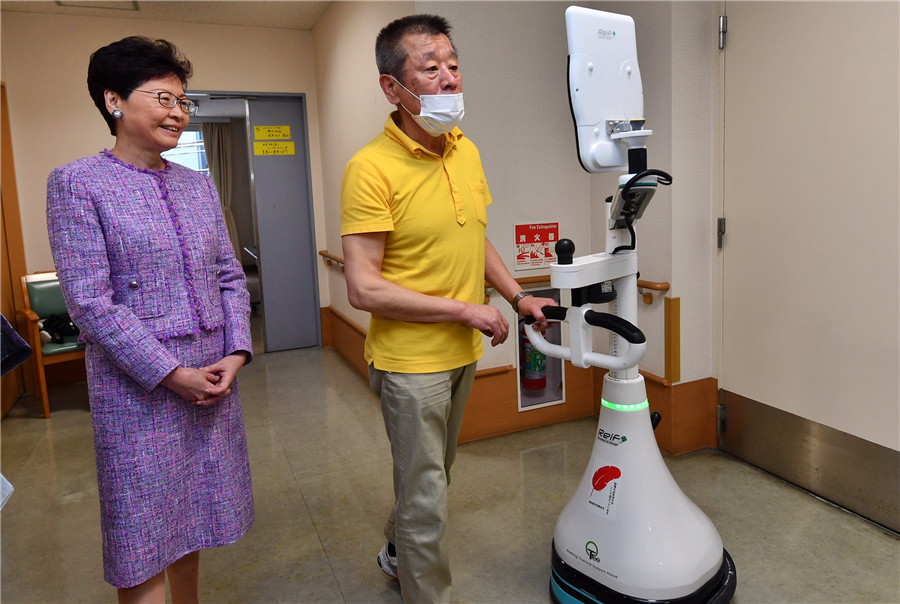Countries adopting a new high-tech approach to aging care


Hong Kong is one of many cities making efforts to resolve the complex issue of social care in aging societies.
Statistics released by Japan's Ministry of Internal Affairs and Communications show that 35.57 million people or 28.1 percent of the country's population was age 65 and older in 2018, with more than 2.19 million age 90 and older.
The World Health Organization defines an "aged society" as one where 14 percent of the population is age 65 and older, while a "superaged society" is one in which more than 21 percent of the population is in the same age bracket.
Japan, the world's most "superaged" country and also the most rapidly aging society, has spent many years looking for solutions.
During a business trip to Tokyo last month, Carrie Lam Cheng Yuet-ngor, chief executive of the Hong Kong Special Administrative Region, took special note of a visit to the Shintomi Special Nursing Home for the Elderly. Lam wanted to learn more about technological devices and the help they provide for caregivers, and how they improve quality of life for seniors.
About 5,000 nursing care homes across Japan are assessing where and how robots will fit with senior care.
Shintomi adopted such devices in late 2017, and they are now widely used at the home and other nursing facilities to help caregivers and frontline staff members lift, move and monitor seniors.
Homegrown robots also play a role as companions for seniors at Shintomi. They include Paro, a robotic baby harp seal equipped with a small degree of artificial intelligence that is capable of responding when spoken to and when stroked.
In April 2000, Japan inaugurated a long-term care insurance system to lift some of the burden on seniors. They pay just 10 percent of the cost for insured services, including rental of 13 kinds of assistive device, such as wheelchairs, electric beds, walking sticks and mobility aids.
FranceBed, the first company to introduce healthcare bed rentals to Japan in the 1980s, now offers rental and sales of support equipment and at-home healthcare aids. It is working with the Hong Kong government and a number of nongovernmental organizations in the city. In reply to questions from China Daily, an email from France-Bed said the company plans to establish more tech rental plans for Hong Kong residents.
Singapore, a country with issues similar to Hong Kong in terms of its economic, social and cultural environments, has set out a smart country blueprint to meet the challenges of the "silver tsunami".
A 10-year master plan to improve Singapore's information-communication infrastructure was laid out in 2015.
Under its healthcare and biomedical science program, Singapore proposes building an integrated health information system through a concerted effort by the island state's eight public hospitals.
The hospitals run trials of innovative, productive devices or systems to assess their usefulness in managing the medical, administrative, financial and legal aspects of operating public hospitals.
E-medical records, filmless X-rays, an online hospital pharmacy and an e-service portal for health and fitness training are also part of the plan.
As of June last year, some 547,900 people age 65 and older were living in the country, accounting for 9.7 percent of the population, according to the Singapore Department of Statistics. It is estimated that the number will almost double to around 900,000 by 2030, meaning about a quarter of the population will potentially be in need of care.
Noting Hong Kong's rapidly aging population, Lou Wei-qun, director of the Sau Po Centre on Ageing at the University of Hong Kong, said the city lags behind its Asian counterparts in terms of senior care.
She said Hong Kong lacks a clear blueprint to become a smart city built on gerontech - technology designed to assist comfortable aging - and suggested the government should work with stakeholders to map out a detailed plan.
Lou also proposed the establishment of a big data center focused on the senior care industry, particularly gerontech, to boost the sector's development.
She also called for a change of mindset which would see seniors regarded as assets, rather than a burden on society.
- China moves to set national standards for pre-made dishes
- Chinese company unveils plans for commercial space flights
- Latest addition to Shiziyang Bridge constructions brings main tower above 300 meters
- Hebei's 'ancient pressure cooker' setting internet ablaze
- Major urban renovation restores Xi'an's ancient moat
- China launches nationwide employment assistance program





































